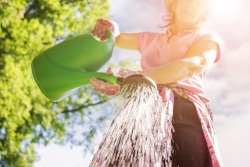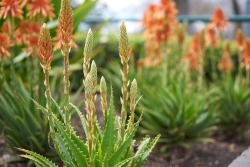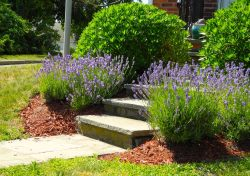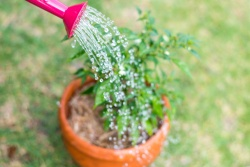Gardens can be water intensive, and South Africa has a limited amount of water available due to its lower than global average annual rainfall.
 By using water in intelligent and resourceful ways, we will be able to save water while still enjoying its benefits. Concerned consumers are looking for ways to contribute towards preserving the environment, as well as saving on high water bills.
By using water in intelligent and resourceful ways, we will be able to save water while still enjoying its benefits. Concerned consumers are looking for ways to contribute towards preserving the environment, as well as saving on high water bills. The growing population has led to an increase in water consumption, and many disadvantaged rural communities still do not have access to adequate clean water resources. This means that urban South Africans with regular access to water need to ensure that every drop is used to the maximum.
Wetec shares some water-saving tips…
What should my family do?
This does not mean that urban families should abandon their ideal of a beautiful garden. The decision to plant and nurture a garden makes a significant contribution to improving the value of your home, and also offers your family the opportunity to enjoy the benefits of a healthy lifestyle.
Providing your children with a safe space to play and discover nature is one reason to establish a family garden, while gardening itself is an excellent way to reduce your daily stress levels. The sense of accomplishment that is gained from watching your garden bloom can play a significant role in maintaining good mental health.
We have lost wide areas of trees and greenery due to the recent rapid rates of urban development, and helping to replenish these lost trees and plants is critical in maintaining healthy air in our cities.
 Generally, the best suited plants are those that are indigenous to your area, as they seldom need additional watering.
Generally, the best suited plants are those that are indigenous to your area, as they seldom need additional watering.Beautiful parks and public spaces play an important role in building a healthy society. A water-wise garden requires less maintenance than normal gardens, while helping to contribute towards preserving the environment. By using water in intelligent and resourceful ways, we will be able to save water while still enjoying its benefits.
1. Choose water-wise plants
Generally, the best suited plants are those that are indigenous to your area, as they seldom need additional watering. They are usually well suited to the average amount of water your garden will receive naturally.
2. Group plants according to their water needs
In this way you can choose plants which might be very beautiful, but which might require more water. If you plant these in groups you can use some of the other tips below to minimise water loss.
3. Maintain your garden
Spend time in your garden to ensure your plants are receiving the right amount of water.
 Mulching, which involves covering the soil with a thick layer of bark or compost, keeps your soil much more moist.
Mulching, which involves covering the soil with a thick layer of bark or compost, keeps your soil much more moist.Remove unwanted plants as well as invader species which draw water away from other plants and damage boundary walls and soil quality.
Remember to plant more perennials than summer annuals, as they have deeper root systems and need less watering during the warmer months of the year.
4. Improve your soil and add mulch
Your soil's water-holding capacity is improved by higher organic matter content. Mulching, which involves covering the soil with a thick layer of bark or compost, keeps your soil much more moist.
5. Plant new plants in the right season
For winter rainfall areas this is in autumn and early winter so the plants have a chance to develop their root systems before the dry season.
In summer rainfall areas it is spring and early summer for the same reason. Lightly water the holes before you plant to provide the optimal conditions for the new shrub, plant or tree.
6. Find out what type of soil you have
 Find out what type of soil your garden has. This will affect the amount of time you need to water to achieve optimal results.
Find out what type of soil your garden has. This will affect the amount of time you need to water to achieve optimal results.This will affect the amount of time you need to water to achieve optimal results. Test how long you can water before you start to experience run-off.
Watch out for clay soil, which has a low water infiltration rate and will need to be watered in short bursts to allow the water to penetrate.
Plant beds can consume a large amount of water, but mulching and adding water retention granules will substantially reduce your need to water.
7. Use edging to ensure the water stays where you use it
Edging around your beds also helps retain the mulching and creates a natural line between beds and the lawn areas.
8. Pot plants
Placing woodchips around the base of outdoor pot plants will help the soil retain the water.
Cast stone pots stay much cooler than plastic ones, absorbing less heat during the day and necessitating less watering.
 Placing woodchips around the base of outdoor pot plants will help the soil retain the water.
Placing woodchips around the base of outdoor pot plants will help the soil retain the water.9. Plan your garden before you plant
Research how large each plant or tree is likely to grow and then take this into account when you plant.
Many small complex gardens are filled with plants that have now grown too large and are either killing other plants or endangering boundary walls. Initially, a new garden may appear a bit sparse, but as the plants grow, they will naturally fill these spaces without taking over.
10. What time of day should I water?
The best times to water are early in the morning or in the early evening, but these rules do change based on the seasons.
Watering in the evening in winter can put your plants at risk for frost damage.
Avoid watering at midday, as the sun is at its height and thus evaporation levels are at their highest, meaning less water will reach the roots.
Watering at night in summer can increase your garden's risk for contracting fungal diseases. This tip especially applies to lawns.
Article courtesy of www.wetec.co.za.
Read more on water-friendly plants to grow in your garden.








